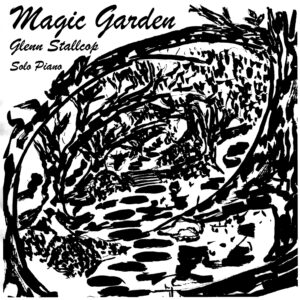Glenn Stallcop Composer, Performer


A piano album concerning the uncertainty of our Future
An Exploration of Ageless Innocence.
Many times I have realized that my thoughts and hopes about life, happiness, my career, and many other things have turned out to be innocent fantasy. Innocence comes in many forms, from simple naivety to outright delusion. Sometimes the effect is inconsequential; sometimes it permeates the core of our existence. This album explores innocence through the metaphor of a magic garden. From the Garden of Eden to the “Primrose Path,” we have all been there! Quaint, surprising, enchanting, mysterious, even charming, this garden is an extravagant diversion for some, and a dangerous intoxication for others.
- Strolling. The joys of a garden are in the details. A big picture doesn’t do it. The opening track explores these little intricacies as it works its way in deeper and deeper. At the end, it realizes that it doesn’t know where it is.
- To the Right. Tracks 2 & 6 start in the same place but go in different directions. The piece actually works its way back to the opening chord several times in the interim, but it’s where it goes in between that is the most interesting.
- Intermezzo No. 1. What distinguishes this intermezzo is how it proceeds. It uses an idea from Japanese oral poetry called chained verse, where new verses (or in music, phrases) borrow something from the preceding verse (phrase) to create a new idea. This can make for subtle changes or wholesale shifts, depending on the idea and inspiration. The Japanese used to use haiku and other syllabic poetry forms, and would chain them together at parties, with a different person inventing each verse. It would be like taking turns singing improvised verses to “Frankie and Johnny,” and often just as racy.
- Oven Mitt. All pianists sometimes sound like they forgot to take their gloves off. On this track, it sounds like maybe I forgot to take off an oven mitt.
- Bluebells. Bluebells chime in a magic garden.
- To the Left. We return to where we started in Track No. 2, but it’s not the same. Awareness is not sin, but it does take the sheen off a little bit.
- You Can Never Return. Innocence, like ignorance, may indeed be bliss, but once it is revealed, it can never be reacquired. Paradise Lost is usually more instructive than harmful, however, and there are many other gardens to explore.
This album is a bit softer and gentler than some of my albums, and tends to be rather good-natured. It’s not that innocence doesn’t resort to delusional ranting every once in a while, but that doesn’t happen here. This album was recorded at my home in Phoenix during the fall of 2010.
An exploration of ageless innocence.
A piano album concerning the
uncertainty of our Future
Many times I have realized that my thoughts and hopes about life, happiness, my career, and many other things have turned out to be innocent fantasy. Innocence comes in many forms, from simple naivety to outright delusion. Sometimes the effect is inconsequential; sometimes it permeates the core of our existence. This album explores innocence through the metaphor of a magic garden. From the Garden of Eden to the “Primrose Path,” we have all been there! Quaint, surprising, enchanting, mysterious, even charming, this garden is an extravagant diversion for some, and a dangerous intoxication for others.
- Strolling. The joys of a garden are in the details. A big picture doesn’t do it. The opening track explores these little intricacies as it works its way in deeper and deeper. At the end, it realizes that it doesn’t know where it is.
- To the Right. Tracks 2 & 6 start in the same place but go in different directions. The piece actually works its way back to the opening chord several times in the interim, but it’s where it goes in between that is the most interesting.
- Intermezzo No. 1. What distinguishes this intermezzo is how it proceeds. It uses an idea from Japanese oral poetry called chained verse, where new verses (or in music, phrases) borrow something from the preceding verse (phrase) to create a new idea. This can make for subtle changes or wholesale shifts, depending on the idea and inspiration. The Japanese used to use haiku and other syllabic poetry forms, and would chain them together at parties, with a different person inventing each verse. It would be like taking turns singing improvised verses to “Frankie and Johnny,” and often just as racy.
- Oven Mitt. All pianists sometimes sound like they forgot to take their gloves off. On this track, it sounds like maybe I forgot to take off an oven mitt.
- Bluebells. Bluebells chime in a magic garden.
- To the Left. We return to where we started in Track No. 2, but it’s not the same. Awareness is not sin, but it does take the sheen off a little bit.
- You Can Never Return. Innocence, like ignorance, may indeed be bliss, but once it is revealed, it can never be reacquired. Paradise Lost is usually more instructive than harmful, however, and there are many other gardens to explore.
This album is a bit softer and gentler than some of my albums, and tends to be rather good-natured. It’s not that innocence doesn’t resort to delusional ranting every once in a while, but that doesn’t happen here. This album was recorded at my home in Phoenix during the fall of 2010.